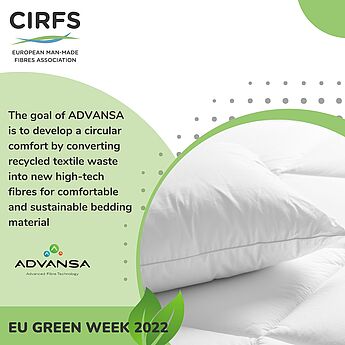"The goal of ADVANSA is to develop a circular comfort by converting recycled textile waste into new high-tech fibres for comfortable and sustainable bedding material."
Circularity and innovative solutions represent a significant opportunity for Germany-based polyester fibre producer ADVANSA who optimizes resources by recycling textile waste scraps giving them a new beginning as filling material. These scraps are depolymerised and then transformed into polymers to create high-quality fibres with premium comfort for duvets, pillows, and mattresses.
According to Textile Exchange, 99% of recycled polyester is currently made from bottles. While bottle-to-fibre recycling brings significant sustainability advantages (80% reduction in carbon footprint) they also challenge the textile industry to increase the percentage of recycled polyester from 14% to 45% by 2025. ADVANSA aims to support this goal with its Eco-Origin™ project, which is designed to increase the use of recycled material by using additional textile scraps as raw material for polyester.
Every year, EU consumers discard 5.8 million tonnes of textiles and only a quarter is recycled, the remaining 4.3 million tonnes are dumped.* They mainly go to landfill or to energy recovery. Textile recycling has many challenges. When recycled, they are often shredded and used for producing low quality material.
As polyester is a relatively easy-to-recycle material, this represents a great opportunity for ADVANSA to use recycled textiles as a valuable raw material for its polyester fibre production.
The resource efficiency plays a key role in addressing the complex challenges for international companies like ADVANSA, therefore we are also looking at other solutions to avoid wasting valuable resources. When bedding reaches the end of its life, it is important that fibres do not end up in waste. With its latest manufacturing process, ADVANSA is taking post-consumer fibre waste and processing it to regenerate into first-grade filling material of the highest quality, help reducing the impact of waste on the environment.


